人教版七年级下册英语Unit 3 知识点语法归纳总结
- 格式:docx
- 大小:39.62 KB
- 文档页数:10

七年级英语下册Unit3知识点Section A1.Take the train/bus/subway “坐火车/公共汽车/地铁”句型:乘坐某种交通工具去...Take a 交通工具 to 地点= go to 地点 by 交通工具= walk/drive/fly ... to 地点= go to 地点 on/in a(an/the) 交通工具Eg: I will take a plane to Beijing.= I will go to Beijing by plane.= I will fly to Beijing.= I will go to Beijing in a plane.“我将坐飞机去北京。
”注意:1)subway在英式英语中意为“地下通道”。
英式英语的“地铁”是underground 2)train作名词时,意为“火车”Train作动词时,意为“训练”Eg: They trained the dog to sniff out drugs.“他们训练狗嗅出毒品。
”2.Ride a bike to 地点= go to 地点 by bike= ride to 地点“骑自行车去某地”Eg: Tony rides a bike to school every day.= Tony goes to school by bike every day.= Tony rides to school every day.“托尼每天骑自行车去学校。
”注意:ride 作动词时,意为“乘车,搭乘”ride也可作名词,意为“(乘车或骑车的)短途旅行”;常用词组:give sb. a ride “让......搭车”;go for a ride “去兜风”Eg: Can you give me a ride?“你能让我搭一下车吗?”3.Walk作动词时,意为“步行;行走”,常用短语walk to ... “走路去......”Eg: They walk to the park.“他们走路去公园。

人教版七年级英语下册Unit 3 How do you get to school?一、重点讲解1.take a/the train搭火车用动词短语表示交通方式,有以下两种情况:①用“take a/ the +交通工具名词”表示交通方式。
如: take a bus(乘公共汽车), take a ship(乘轮船), take a plane (乘飞机), 但“骑自行车”要用ride a bike来表示。
如: They often take a train to Beijing. 他们经常乘坐火车去北京。
②用某种动词来表示交通方式。
如:walk to(步行去),drive to(开车去),ride to(骑马/车去), fly to (乘飞机去)等。
2.how far 离…….多远,用来询问距离。
回答该问句常用It’s …meters/ kilometers/miles.如:–How far does your uncle live from here? 你叔叔住的地方离这儿有多远?–It’s 5 kilometers. 五千米。
3.cross= go/ walk across横穿+ road/street/bridge马路/街道/桥4. there be句型表示“某地存在有某人或某物”,要用就近原则。
拓展:not only…but also(不但…而且), either…or(不是…就是), neither…nor(既不…也不)也用就近原则。
如:There is a pen and two books on the desk. There are two books and a pen on the desk.5.W hy not do…?为什么不做...?类似句型:Why don’t you do…? 为什么不做...?二.同步句型&讲解1.How do you get to school? I ride my bike. 你怎样去学校?我骑自行车去。
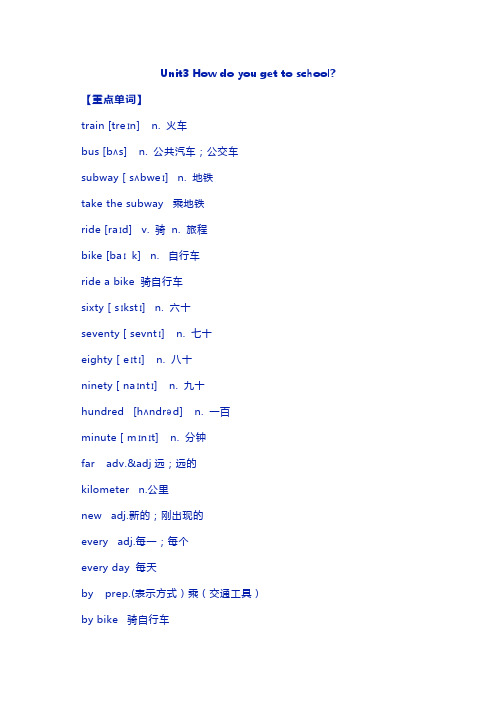
Unit3 How do you get to school?【重点单词】train [treɪn] n. 火车bus [bʌs] n. 公共汽车;公交车subway [ sʌbweɪ] n. 地铁take the subway 乘地铁ride [raɪd] v. 骑n. 旅程bike [baɪk] n. 自行车ride a bike 骑自行车sixty [ sɪkstɪ] n. 六十seventy [ sevntɪ] n. 七十eighty [ eɪtɪ] n. 八十ninety [ naɪntɪ] n. 九十hundred [hʌndrəd] n. 一百minute [ mɪnɪt] n. 分钟far adv.&adj远;远的kilometer n.公里new adj.新的;刚出现的every adj.每一;每个every day 每天by prep.(表示方式)乘(交通工具)by bike 骑自行车drive v.开车car n.小汽车;轿车live v.居住;生活stop n.车站;停止think of 认为cross v.横过;越过river n.河;江many adj.&pron.许多village n.村庄;村镇between prep.介于…之间between…and…在……和……之间bridge n.桥boat n.小船Ropeway n.索道year n.年;岁afraid adj.害怕;惧怕like prep.像;怎么样leave v.离开dream n.梦想;睡梦v.做梦true adj.真的;符合事实的come true 实现;成为现实【重点短语】1. get to school 到达学校2. take the train 乘火车3. take the subway 乘地铁4. ride a bike 骑自行车5. how do you get to school 怎么到达学校6. one hundred and five 1057. how far 多远8. how long 多长时间9. it takes sb some time to do sth 它花费某人多长时间做某事10. ride the bike to school 骑自行车到学校11. walk to , drive to ,fly to…步行去…;开车去…;坐飞机去….12. every day 每天13. I’m not sure 我不敢确信14. about= around 大约15. 10 kilometers 十公里16. good exercise 好的锻炼17. drive his car to work 开车去上班18. in his father’s car 坐父亲的车19. need about 10 minutes to get to school 需要十分钟的时间到达学校20. what do you think of…=how do you like…你觉得怎么样21. cross the river 过河22. It is easy to get to school. 到达学校很容易。

人教版七年级英语下册Unit 3 重点知识点总结人教版七年级英语下册Unit 3 重点知识点总结Unit 3 Why do you like koalas?一、词组want to do sth .想要做某事want sb to do sth 想要某做某事want sth 想要某物Let sb do sth 让某人做某事d of 有几分种类a kind of 一种……years old …年龄如:ten years old 十岁like to do sth 喜欢做某事like doinglay with … 与...一起玩be quiet 安静during the day 在白天at night 在夜间have a look at.. 看…一个...另一个二、句型(1)、-why do you like pandas?-Because they’re very cu(2)、-Why dose he like koalas?-Becauare kindg.(3)、-Where are l?-Lions auth Africa.(4)、-What animals do you like?-I like elepha三、日常交际用语(1)、-Let’l(2)-Why do you walions?-Becaare very cu(3)-Do you like giraffes?I do./ No,I don’t(4)-Whaanimal do you like?_I like dog+ 名词的复数.表示没有特定的数量范围+名词的复数表示有特定的数量范围.(5)-Why are you looking at me?-Because you are very cu(6)-Let us play games. –Great!L。

Unit3SectionA知识点1.ride v.&n.(1)作动词讲,意为“骑”。
过去式为rode常用结构:ride a/one's bike骑自行车e.g.He often rides his bike to school.他经常骑自行车去学校。
(2)作名词讲,意为“旅程”常用结构:go for a ride去兜风give sb. a ride让某人搭车e.g. I guess it is about an hour's bus ride to get there.我想乘公交车到那里要大约一个小时吧。
Can you give me a ride to the supermarket?你能让我搭车去超市吗?I'd like to go for a ride.我想出去兜风。
2.hundred 一百(1)当表示具体的“几百”时,用“基数词+hundred”表示,注意此时hundred用单数形式,且其后不能加ofe.g.There are about eight hundred students in our school.我们学校大约有八百名学生。
(2)hundreds of 表示“数以百计的,成百上千的”,此时不能与数词连用e.g.There are hundreds of people in the restaurant.这家餐馆里有数百人。
【拓展】类似用法的词:thousand千million百万billion亿3.far adv.&adj.远;远的常用短语:far from离...远e.g.My home is very far from here.我家离这里很远。
How far is it from your home to school?从你家到学校有多远?【注意】far表示笼统、模糊概念的“远”,若要表示具体的“远”应该用away。
e.g.My home is 10 kilometers away from here.我家离这儿10千米远。

七年级英语下册Unit 3写作知识讲解【语法】(一)how用法总结:(1)How 用来询问方式方法:用来提问到达某地的方式。
句子结构为:How + do/does + 主语 + 谓语 + 其他?Eg: -- How do you go to school?你怎么去学校?-- I go to school by bike.我骑自行车去上学。
(2)How 用来询问身体健康状况:句子结构为:How + be动词 + 主语?Eg: -- How are you?-- Fine, thank you.--你好吗?-- 我很好谢谢。
(3)How 用来询问最近过得如何:句子结构为:How + be动词/do + 主语 + going?Eg: -- How do you get on with other students?-- Very well.--你和其他学生相处怎么样?-- 非常好。
(4)How 用来询问天气情况:句子结构为:How is the weather?Eg:-- How is the weather in Beijing?= What is the weather like in Beijing?-- It’s rainy.-- 北京天气怎么样?-- 有雨。
(5)How 用来引导感叹句:句子结构为:How + 形容词/副词 + 主语 + 谓语!Eg: How fast he runs!他跑得多快啊!(二)how与形容词副词搭配提问:(1)How many “多少”;用来提问可数名词复数Eg: How many students are there in your class?你们班有多少学生?(2)How much “多少”;用来提问不可数名词数及价格Eg: How much water do you need?你需要多少水?How much are these dresses?这些连衣裙多少钱?(3)How far “多远”;用来询问距离Eg: How far is your home from your school?你家离学校多远?(4)How long “多长时间”;用来询问时间长短或物体长度Eg: How long does it take you to get to school?你花多长时间到学校?How long is the ruler?这把尺多长?(5)How often “多久一次”;用来询问频率Eg: How often do you exercise?你多久锻炼一次?(6)How soon “多久之后”;用来询问时间段Eg: How soon will you be back?你多久回来?(7)How old “多大”;用来询问年龄Eg: How old are you ?你多大了?(8)How about “怎么样”;用来提建议或咨询建议Eg: How about this one?这个怎么样?【知识讲解】1.Drive作动词时,意为“开车;推动;驱赶”常用结构:drive sb.to 地点“某人开车去某地”Eg: My father drives me to school.“我爸爸开车送我去学校。

Unit3 单元要点梳理总结重点短语1.学校旅行school trip2.去散步go for a walk3.挤牛奶milk a cow4.骑马ride a horse5.喂鸡feed chickens6.与农民交谈talk with a farmer7.照相take photos 8.问一些问题ask some questions9.种苹果grow apples 10.带某人逛/参观某地show sb. around11.学到许多learn a lot 12.摘草莓pick some strawberries13.上周last week 14.在乡村in the countrysidevisit my grandparents 16.去钓鱼go fishing15.拜访我的祖父母17.去爬山climb the mountains 18.参观博物馆visit a museum19. 画画draw pictures 20.去学校旅行go on a school trip21.礼品店gift shop 22.为某人买某物buy sth for sb.23.总得来说all in all 24.对……感兴趣be interested in...25.一点儿也不not...at all重点句型1.你见到奶牛了吗?Did you see any cows?2.我见到了而且见到了很多很多。
Yes, I did. I saw quite a lot.3.卡罗尔拍照片了吗?Did Carol take any photos?4.是的,她拍了。
Yes, she did.5.你好,Eric,上周旅游怎么样?Hi, Eric, How was your trip last week?6.精彩极了,我还去乡下看望了爷爷奶奶。
It was excellent. I visited my grandparents in thecountryside.7.我们玩得非常开心!We had so much fun!8.我也拍了好多精彩照片。
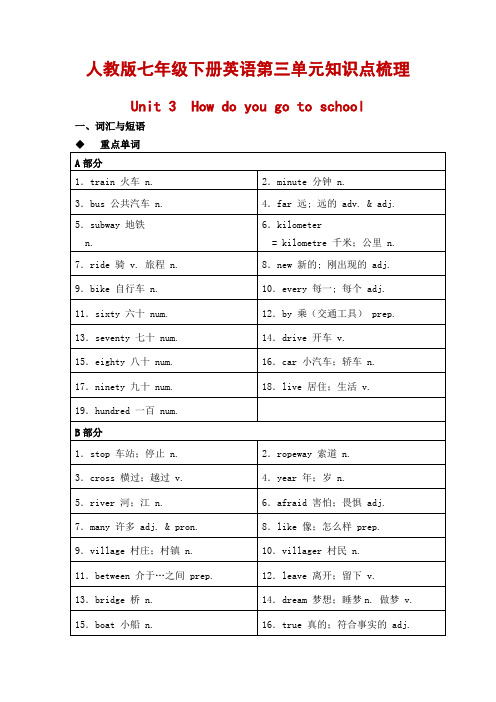
人教版七年级下册英语第三单元知识点梳理Unit 3 How do you go to school一、词汇与短语◆重点单词◆重点句子◆重点单词变形二、语法知识点A部分知识点1.与how构成的词组引导的特殊疑问句❶ how表示爱好、程度、看法等,意为“……怎么样?”。
eg:—How do you like the music?你觉得这首乐曲如何?—I like it very much.我非常喜欢它。
How is your Chinese?你的汉语如何?How do you like China?你认为中国怎么样?❷用于询问身体健康状况,意为“……怎么样?”。
eg:How do you do?你好!How are you?你(身体)好吗?❸ how提问交通方式。
其答语分三种情况:◆take a/the+表示交通工具的名词◆by +表示交通工具的单数名词◆on/in+限定词+表示交通工具的名词eg:How do you go to workevery day? 你每天怎样去上班?I take the subway to work. 我乘地铁去上班。
=I go to work by subway.=I go to work in the subway.❹表示感叹。
eg:How cold it is today!今天好冷啊!How hard they are working!他们在多么辛勤地劳动啊!How fast he runs!他跑得多快啊!❺表示某种方式、手段或方法。
eg:How do you spell it?你怎样拼写它?How did he go to schoolyesterday?他昨天是怎样去上学的?How do you know about it?你怎么知道这件事的?❻ how about用于询问或征询意见等,相当于what about,后接名词、代词或动词的-ing形式,意为“……怎么样?”。

初一下册三单元语法
初一下册第三单元的语法:
1. 一般现在时:学习一般现在时的用法,包括肯定句、否定句和疑问句的构成,以及用于表示经常性或习惯性的动作、状态或事实。
2. 人称代词和物主代词:进一步学习人称代词(如I, you, he, she, it 等)和物主代词(如my, your, his, her, its 等)的用法,包括主格和宾格形式。
3. 名词复数:学习名词复数的构成规则,例如加-s 或-es,以及一些不规则复数形式。
4. 方位介词:学习一些常用的方位介词,如in, on, under, behind, near 等,用于描述物体的位置关系。
5. 特殊疑问句:学习如何用特殊疑问词(如what, where, when, how 等)来构成特殊疑问句,并学会如何回答这些问题。

七年级下册讲义Unit 3 How do you get to school?一、重点单词1.火车train2.bus 公共汽车3.subway 地铁4.ride 骑;旅程5.bike 自行车6.sixty 六十7.seventy 七十8.eighty 八十9.ninety 九十10.hundred 一百11.minute 分钟12.far 远;远的13.kilometer 千米;公里14.new 新的15.every 每一个16.by 表示方式;乘17.drive 开车18.car 小汽车19.live 居住;生活20.stop 车站;停止21.river 河;江22.between 介于…之间23.year 年;岁24.afraid 害怕25.like 像;怎么样26.leave 离开二、重要短语1. take the train 乘火车2. 乘公交车take the bus3. go by bike 骑自行车4. go by subway 乘地铁5. ride a bike 骑自行车6.开小汽车drive a car7. 认为think of 8. between... and…在…和…之间9.离开家leave home 10. leave school 离开学校11. come true 实现,成为现实三、词汇、句型讲解及拓展1. one hundred and five ★①.1-9基数词形式加“hundred”,表示几百,在几十几与百位间加上and。
I have six hundred apples. 我有六百个苹果six hundred and thirty-one 631a hundred and one 101②.hundreds of表示“数百;成百上千的”,这是hundred后面有s,而且hundreds后面要有介词of, 并且不能与数词连用。
与hundred 用法类似的还有单词:thousand,million,billion.1.【2017重庆中考】_____ trees have been planted near here, so the air is very fresh.A. Two hundredsB. Hundred ofC. Hundreds ofD. Hundreds2.-How far away is the small village from Moscow?-It’s about ______ kilometers.A. seven hundred and twenty twoB.seven hundred and twenty-twoC. seven hundreds and twenty-twoD. seven hundreds and twenty two2. I ride it to school every day. ★①.every “每个;每一”,其后接单数可数名词。
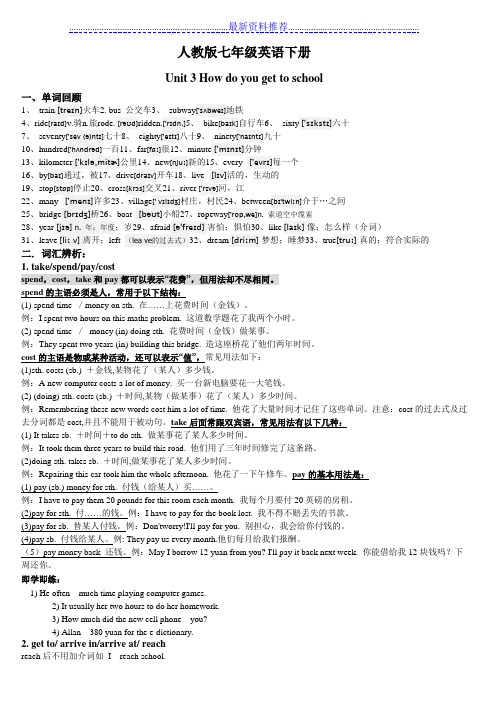
人教版七年级英语下册Unit 3 How do you get to school一、单词回顾1、train[treɪn]火车2. bus 公交车3、subway['sʌbweɪ]地铁4、ride[raɪd]v.骑n.旅rode. [rəʊd]ridden.['rɪdn.]5、bike[baɪk]自行车6、sixty['sɪkstɪ]六十7、seventy['sev (ə)ntɪ]七十8、eighty['eɪtɪ]八十9、ninety['naɪntɪ]九十10、hundred['hʌndrəd]一百11、far[fɑː]很12、minute['mɪnɪt]分钟13、kilometer['kɪlə,mitɚ]公里14、new[n juː]新的15、every ['evrɪ]每一个16、by[baɪ]通过,被17、drive[draɪv]开车18、live [lɪv]活的,生动的19、stop[stɒp]停止20、cross[krɔs]交叉21、river ['rɪvə]河,江22、many ['menɪ]许多23、village[' vɪlɪdʒ]村庄,村民24、between[bɪ'twiːn]介于…之间25、bridge[brɪdʒ]桥26、boat [bəʊt]小船27、ropeway['rop,we]n. 索道空中缆索28、year[jɪə]n. 年;年度;岁29、afraid[ə'freɪd]害怕;惧怕30、like [laɪk]像;怎么样(介词)31、leave [liː v]离开;left (lea ve的过去式)32、dream[driːm]梦想;睡梦33、true[truː]真的;符合实际的二. 词汇辨析:1. take/spend/pay/costspend,cost,take和pay都可以表示“花费”,但用法却不尽相同。

Unit 3 How do you get to school?一、词汇集锦train ________ bus _______ subway ________ take the subway ________ride ________ bike _______ ride a bike ________ sixty ________ seventy _________ eighty ________ ninety ________ hundred _______ minute ________ far _________ kilometer ________ new ________ every _______ every day ________ by _______ by bike _______ drive ________ car _________ live_______ stop _______ think of _______cross ________ river ________ many _______ village _______ between _________ between…and…____________ bridge ________ boat ________ ropeway ________ year __________ afraid________ like _______ villager _________ leave ___________ dream ________ true ____________ come ture _______二、短语归纳1. get to school 到达学校2. take the train 乘火车3. take the subway 乘地铁4. ride a bike 骑自行车5. how do you get to school 怎么到达学校6. one hundred and five 1057. how far 多远8. how long 多长时间9. it takes sb some time to do sth 它花费某人多长时间做某事10. ride the bike to school 骑自行车到学校11. walk to , drive to ,fly to…步行去…;开车去…;坐飞机去….12. every day 每天13. I’m not sure 我不敢确信14. about= around 大约15. 10 kilometers 十公里16. good exercise 好的锻炼17. drive his car to work 开车去上班18. in his father’s car 坐父亲的车19. need about 10 minutes to get to school 需要十分钟的时间到达学校20. what do you think of…=how do you like…你觉得怎么样21. cross the river 过河22. It is easy to get to school. 到达学校很容易。
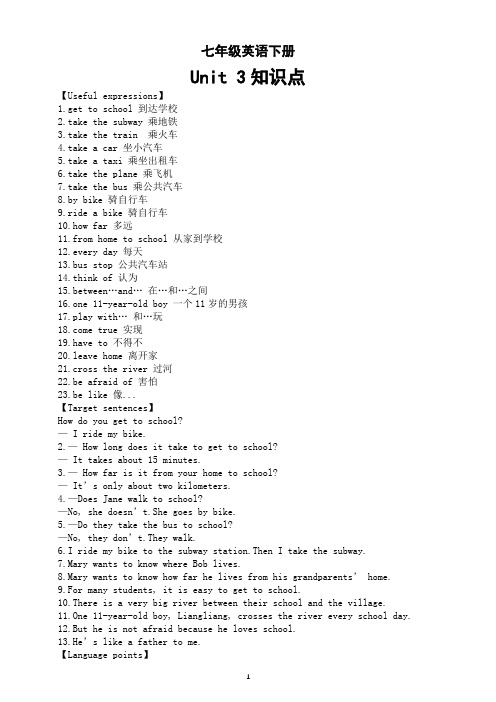
七年级英语下册Unit 3知识点【Useful expressions】1.get to school 到达学校2.take the subway 乘地铁3.take the train 乘火车4.take a car 坐小汽车5.take a taxi 乘坐出租车6.take the plane 乘飞机7.take the bus 乘公共汽车8.by bike 骑自行车9.ride a bike 骑自行车10.how far 多远11.from home to school 从家到学校12.every day 每天13.bus stop 公共汽车站14.think of 认为15.between…and…在…和…之间16.one 11-year-old boy 一个11岁的男孩17.play with…和…玩e true 实现19.have to 不得不20.leave home 离开家21.cross the river 过河22.be afraid of 害怕23.be like 像...【Target sentences】How do you get to school?— I ride my bike.2.— How long does it take to get to school?— It takes about 15 minutes.3.— How far is it from your home to school?—It’s only about two kilometers.4.—Does Jane walk to school?—No, she doesn’t.She goes by bike.5.—Do they take the bus to school?—No, they don’t.They walk.6.I ride my bike to the subway station.Then I take the subway.7.Mary wants to know where Bob lives.8.Mary wants to know how far he lives from his grandparents’ ho me.9.For many students, it is easy to get to school.10.There is a very big river between their school and the village.11.One 11-year-old boy, Liangliang, crosses the river every school day.12.But he is not afraid because he loves school.13.He’s li ke a father to me.【Language points】1.take the subway 乘地铁take作动词,意为“乘坐”。
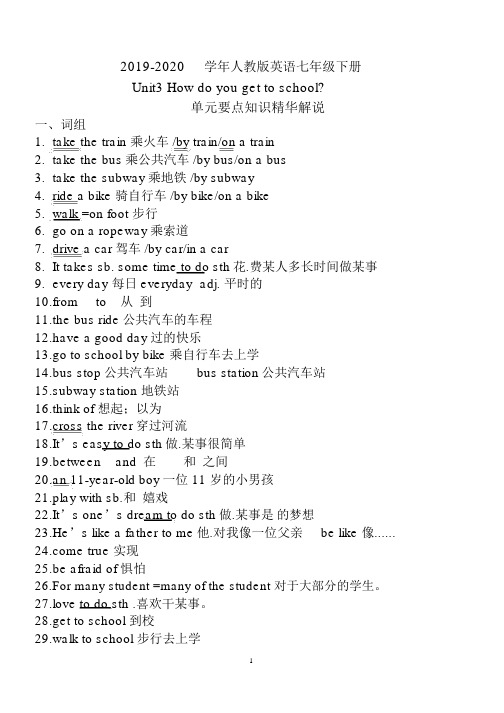
2019-2020学年人教版英语七年级下册Unit3 How do you get to school?单元要点知识精华解说一、词组1.take the train 乘火车 /by train/on a train2.take the bus乘公共汽车 /by bus/on a bus3.take the subway乘地铁 /by subway4.ride a bike 骑自行车 /by bike/on a bike5.walk =on foot 步行6.go on a ropeway乘索道7.drive a car驾车 /by car/in a car8.It takes sb. some time to do sth花.费某人多长时间做某事9.every day 每日everyday adj. 平时的10.from to从到11.the bus ride公共汽车的车程12.have a good day过的快乐13.go to school by bike 乘自行车去上学14.bus stop公共汽车站bus station公共汽车站15.subway station 地铁站16.think of 想起;以为17.cross the river穿过河流18.It’s easy to do sth做.某事很简单19.between and在和之间20.an 11-year-old boy一位 11 岁的小男孩21.play with sb.和嬉戏22.It’s one’s dream to do sth做.某事是的梦想23.He’s like a father to me他.对我像一位父亲be like 像......e true 实现25.be afraid of 惧怕26.For many student =many of the student 对于大部分的学生。
27.love to do sth .喜欢干某事。

人教版七年级下册英语知识点Unit 3 How do you get to school?一、词汇拓展subway(同义词)underway ride(现在分词)ridingbike(完全式)bicycle far from(反义词)near tokm(完全式)kilometer drive(现在分词)drivingcross (介词)across (名词)crossing village(指人)villagerleave/li:v/ live /liv/stop(同义词) station二、重点短语take the train=by train乘火车take the bus=by bus 乘公共汽车take the subway=by subway 乘地铁ride a bike=by bike 骑自行车how long 多久,多长how far多远bus stop 公共汽车站think of 认为between…and… 在…和…之间one 11-year-old boy 一个11岁的男孩play with… 和…玩come true 实现have to do sth 不得不做某事walk to school走路上学the bus ride乘公共汽车from home to school 从家到学校every day 每天from here 从这儿get there 到达那儿三、关键句型1. How do you get to school?I ride my bike. = I get to school by bike. = I get to school on my bike.你怎么去上学?我骑自行车。
2. How far is it from your home to school? It’s about three kilometers.从你家到学校有多远?大约3千米。
3. How long does it take you to get to school? It takes me about half an hour onfoot.去上学花费你多久时间?步行大约半个小时。

Unit 3 How do you get to school?1.短语归纳①get to school=arrive at school 到达学校②take the subway 乘地铁③ride a bike 骑自行车④how far 多远⑤from home to school 从家到学校⑥every day 每天everyday日常的⑦take the bus 乘公共汽车⑧leave Beijing for Shanghai离开北京到上海⑨bus stop 公共汽车站⑩think of 认为11between … and … 在…和…之间12one 11-year-old boy 一个11岁的男孩13play with … 和…玩14come true 实现15have to 不得不(客观事实)16must 强调主观必须2.典句必背①How do you get to school?I ride my bike to school.②How far is it from your home to school?③How long does it take you to get to school?④For many students, it is easy to get to school.【many】只加可数名词复数⑤be afraid of sth,害怕某事,某物;⑥be afraid to do sth.害怕做某事⑦There is no bridge. [no]=not a(an)=not any⑧“3 hundred” 3百不加s,hundreds of 数以百计的加s⑨stop doing sth.停止正在做的事情stop to do sth.停下来去做另一件事情。
3.用法集萃(1)怎样表达出行方式:How do you get to school?描述出行方式时,通常会有如下几种形式借助介词by(不加a/the)by bike/bus/car/train/taxi/subway...用take,drive, ride构成的动词短take a/the bus/train/plane语drive a/the one’s carride a/the one’s bike/bicycle借助介词on或in(加a/the)on a/the bike/bus/train; on foot; in a/the car注意:当交通工具的名词(如:bike, bus, train, car等)和by搭配时,它们前面不必加冠词;但当它们和on或in搭配时,它们之间要加冠词。

一轮复习:七下U3 词汇+语法讲解【单词默写】【单词变性】year名词变形容词__________ cross动词变介词__________ drive动词变名词__________ ride动词变名词__________1. far _____________ ________________How far is it from your home to school?As far as I know, the entrance examination has been over.2. dream _________________ ________________ __________________Martin Luther King said, “I have a dream.”I dreamed about snakes around me.I dream of being a pilot when I grow up.3. stop ____________ _______________ _______________ _______________There are thirty stops for the bus.You must stop crying now.Mary stops to sing a song and everyone cheers.I can’t stop him from smoking in classroom.4. ride ______________ _____________ ____________Mary likes to ride a bike around the town.It’s about thirty minutes’ ride from my home to the city center.We plan to have a one-day ride around the Qiandao Lake.5. by ______________ ______________ _________________ _______________ ________________I went to school by bus every day.I learn English by watching English movies.The vase was broken by Mary.I walked by the cafe last night.My uncle dropped by my house last night.I learn English by myself.6. like ________________ _______________ __________________ __________________I like playing football very much.Here are so many fruits like watermelon, mango, apples and so on.He looks like his father.I feel like flying in the sky7. leave ___________ _____________ _______________I left my hometown three years ago.I will leave for Shanghai in three days.I left my homework at home.Mary was left alone at home.8. live _________ __________ ______________Mary lives a happy life.Mary lives in a big house with a garden.Most people like to listen to songs on live.【词汇用法】1. dream: vi./dream about/dream of/dream that2. every: adj./every week/every other day3. stop: v./stop sb. from doing sth./stop to do/stop doing/stop sb.相关词辨析: stop vs. continue vs. forget vs. rememberstop: stop to do/stop doingcontinue: continue to do/continue doingforget: forget to do/forget doingremember: remember to do/remember doing4. live:近形字辨析: live vs. lives vs. alive vs. living vs. livelyLive:/i/ live in sp./live a… life/ai/ on liveLives:/i/ live 的三单形式/ai/ life的复数形式Alive:/ai/ 活着的Living:/i/ 活着的The living girl is still alive after the accident. lively/ai/ 生动的The interesting teacher makes our class lively.5. leave: vt./leave sp./leave for sp./leave sb. alone/leave sth. sp.leave 的短语:leave sb. alone___________________leave behind ____________________ leave out ___________________6. cross: v./v.+across=cross/cross the road近义词辨析: across vs. crossacross: prep./v.+across/across fromcross: v./v.+across=cross/cross the road【攻占语法】介词(方式介词)1. 方式介词: __________ ____________ ________________ ______________2. 方式介词的用法:1) in: +语言/+交通工具Mary can tell stories in English.Mary goes to school in her father’s car.2) on: +foot/+机器(TV/radio/tape/phone)+交通工具We can listen to music on the radio.I go to school on foot.Mary goes to school on a bus.3) by: +doing sth./+交通工具I learn English by watching English movies.I go to school by bus.4) through: +抽象名词(effort/hard work)Mary finally won the competition through her effort.5) with/without: +具体的工具(pen/hammer/knife)/抽象名词(具体动作)He writes his letters with a pen.With his help, I passed the difficult English exam.【词汇练习】1.Children are often a________ of lions because they look very scary.2.The bookstore is b ________ the KFC and Lianhua Supermarket.3.I walked to school this morning, because my b ________ was lost yesterday.4.There is no bridge over the river, so we must get there by b ________.5.For the village, it is their dream to have a b ________. Then crossing the river becomes easy.6.We can practice our spoken English b ________ reading aloud every morning.7.Be careful when you c ________ the road.8.If you work hard, your d ________ will come true.9.Could you please stop singing such a song? It has d ________ me crazy.10.Forty and forty is e ________.11.Jim's home is f________ from school in our class, but he never gets to school late.12.It is about nine h ________ kilometers from Beijing to Xi’an.13.I go to school in my father’s car every day for my home is 5 k ________ away from the school.14.Dick's home is far from school, so he always l ________ early in the morning.15.There is much time l ________. You don’t need to rush.16.That sounds l ________ a good idea to go out on such a sunny.17.Everyone knows that a quarter means fifteen m ________.18.We’re the Targets, and we’re a n ________ band.19.Although his grandfather is in his n ________, he’s still as energetic as a young man.20.Next week is my grandpa’s n _________ birthday, we’re having a big party.21.Jimmy, the Bike Boy is good at r ________ the bikes.22. A 2-year-old boy sometimes doesn’t know there are s _______ minutes in an hour.23. A policeman s ________ a passenger and asked him to show his ID card.24.Shanghai is a big international city with a lot of bikes, buses and t ________. People can get around easily.25.Sue was born in a v ________ but she works in a city now.26.Many of the v ________ don't want to leave their hometown(家乡).27.We hope the villagers' dream can soon come t ________.28.It is all the v________ dream to have a bridge over the river in the village.29.This old man is n ________ years old. He is having his 90th birthday today.30.My home is ten m ________ walk from Intime.【语法练习】1.So far, Lunch Money donations have saved 0.3 km2 of rain forest, sent 22,000 books to Africa and bought20,000 kg of rice for people ________________ enough food.2.It may be true that the past year was full of “down” moments. But it doesn't mean that we’re letting it bring usdown ________________ it.3.Always bring your phone _______________ you, but don’t make it easy for the bad guys to steal it from you.4.To help the body to avoid a fast and deadly hit. ________ the help of the seats, your body can have more timeto slow down the speed in an accident.5.I camped in the mountains ______________ some friends.6.Of course it is a pity to visit here ________ a trip to the top of the CN Tower. This is one of the world’s tallestbuilding.7.He decided to harvest it ____________ hand without a machine.8.“Oh, yes! That’s it! Thank you,” he said. Then he turned around and rushed into the pay telephone again. A fewminutes later, he came out ________ a smile.9.One day, our English teacher Mr. Smith came into the classroom with a book in his hand. He started his lesson________ a question.10.Some people believe that if they are wealthy, they will be able to do anything they want, which means happiness.On the other hand, some people believe that holding a high position in the government is happiness._______________ this way, you have not only money, but also many other things which can’t be bought with money.11.They found that taking a daily photo could improve well-being ______________ self-care and communityinteraction(互动).12.His mother recognized her son’s talent and encouraged it _____________ providing soccer balls, which wereexpensive for them.13.Learning to enjoy myself _____________ depending on computers and other electronic things developed myimagination.14.You don’t need a ticket or a boarding pass-with just your phone, you can be on your plane only 15 minutes afterarriving at the airport. And at hotels, the phone allows you to pay the room _______ using a credit card or money.It even opens your hotel room door!15.He was greatly surprised when his wife pointed to the watch on the table. Now he realized that he had robbedthe Italian of his watch ________ accident.16.There are many teenagers who have too much pressure. Last Wednesday, Mr. Trent began his psychological(心理的) health class ________ holding up a glass of water.17.Most of them said that they were _____________ the way while some said they were still at home.18.When caught in pouring rain ________ an umbrella, most people choose to run. But an old saying advises thata person who runs in the rain gets wetter than one who walks.19.______the help of the Internet, we can learn what other people around the world are doing.20.I usually go to school ______ bike, but sometimes I go to school ______ foot.【参考答案】year名词变形容词yearly cross动词变介词across drive动词变名词driver ride动词变名词rider1. far 远的就…所知How far is it from your home to school?As far as I know, the entrance examination has been over.2. dream 梦想梦到梦想Martin Luther King said, “I have a dream.”I dreamed about snakes around me.I dream of being a pilot when I grow up.3. stop 车站停止停下来阻止There are thirty stops for the bus.You must stop crying now.Mary stops to sing a song and everyone cheers.I can’t stop him from smoking in classroom.4. ride 骑车骑行路程旅途Mary likes to ride a bike around the town.It’s about thirty minutes’ ride from my home to the city center. We plan to have a one-day ride around the Qiandao Lake.5. by 乘坐通过被经过顺便拜访独自I went to school by bus every day.I learn English by watching English movies.The vase was broken by Mary.I walked by the cafe last night.My uncle dropped by my house last night.I learn English by myself.6. like 喜欢比如像感觉像I like playing football very much.Here are so many fruits like watermelon, mango, apples and so on. He looks like his father.I feel like flying in the sky7. leave 离开离开去落下遗漏I left my hometown three years ago.I will leave for Shanghai in three days.I left my homework at home.Mary was left alone at home.8. live 过着居住现场Mary lives a happy life.Mary lives in a big house with a garden.Most people like to listen to songs on live.5. leave: vt./leave sp./leave for sp./leave sb. alone/leave sth. sp. leave 的短语:leave sb. alone让某人一个人leave behind 落在后面leave out 遗漏1. 方式介词: in on by through with/without【词汇练习】Afraid between bike bus bridge by cross dream driven eighty far hundred kilometers leaves left like minutes new nineties ninetieth riding sixty stopped trains village villagers true villiagers’ ninety minutes’【语法练习】With with with With with on by with with In through by by by by by on without With by on。

Unit 3◆短语归纳1.乘火车\公共汽车\飞机\轮船去某地take a\the train\bus\plane\ship to sp.=go to sp. by train\bus\plane\ship2.乘地铁去某地take the subway to sp.=go to sp. by subway3.骑自行车去某地ride a\the\one’s bike to sp.=go to sp. by bike=go to sp. on a\the \one’s bike4.步行去某地walk to sp.=go to sp. on foot5.开车去某地drive a\the\one’s car to sp.=go to sp. by car=go to sp. in a car6.乘出租车去某地take a\the taxi to sp.=go to sp. by taxi=go to sp. in a taxi7.公共汽车之行the bus ride8.自行车十分钟的车程10minute bike ride=10 minutes’ bike ride9.到达学校get to school10.到家get home \ 到这get here \ 到那get there (副词前省略to)11.九百九十九朵玫瑰花(rose) nine hundred and ninetynine roses12.成百上千的村民hundreds of villagers13.离…远be far from… 离…近be near to…14.住得离…远live far from…15.居住在… live in\at…16.过着幸福的生活live\have a happy life17.每天\每星期\每月\每年\每学期every day\week\month\year\term18.公交汽车站bus stop \ 公交客运总站bus station19.在公交车站at the bus stop20.停下来去做某事stop to do sth.停下来去工作stop to work21.停止正在做的事stop doing sth.停止工作stop working22.阻止某人做某事stop sb. (from)doing sth.23.乘索道go on the\a ropeway24.想一下、想一想think of (仔细)思考、考虑think about\think over25.认为think of26.想起think of=think up=e up with27.过马路\过桥\过河cross the road\bridge\river=go\walk across the road\bridge\river28.做索道过河cross the river on a ropeway29.在第二个十字路口at the second crossing30.在你和我之间between you and me31.一个十一岁大的男孩an elevenyearold boy32.一条二十公里长的河流 a twentykilometerlong river33.害怕某事be afraid of sth.34.害怕做某事be afraid of doing sth.= be afraid to do sth.35.像…(品质、性格、外貌) be like36.看起来像(外貌)look like37.想我的父亲一样对我like a father to me38.离开兴城去北京leave Xingcheng for Beijing39.动身前往北京leave for Beijing40.把我的书包落家里leave my schoolbag at home41.梦见某人\某事dream of sb.\sth.E.g.他总是梦到他的母亲。
人教版七年级下册英语Unit 3 知识点语法归纳总结Unit 3 How do you get to school?In this unit。
we will learn how to talk about n and how to describe our daily commute to school.1.Phrases to remember:Get to school: Arrive at schoolTake the subway: Use the subway as nRide a bike: Use a bicycle as nHow far: The distance een two placesFrom home to school: The distance een home and schoolEvery day: DailyTake the bus: Use the bus as nLeave Beijing for Shanghai: Depart from Beijing to Shanghaieful sentences:How do you get to school。
I ride my bike to school.How far is it from your home to school?How long does it take you to get to school?For many students。
it is easy to get to school.age:1) How to express n:How do you get to school?When describing n。
we usually use ns such as "by" (without "a/the").BusThink ofeen。
and。
An 11-year-old boyPlay with。
Come trueHave to (objective fact)Must (emphasize subjective n)Be afraid of somethingBe afraid to do somethingThere is no bridge。
[no]=not a(an)=not any3 hundred" (without "s")。
hundreds of (with "s")doing something (to。
doing something you are currently doing)to do something (to。
and do something else)2) Verb phrases using "take," "drive," and "ride":Take a/the bus/train/planeDrive a/the one's carRide a/the one's bike/bicycle表示“花费(时间/金钱)”,常用于询问或描述行程所需时间。
如:How long does it take to get to the airport?到机场需要多长时间?It takes me 30 minutes to get to work by car.我开车上班需要30分钟。
②get to表示“到达”,表示到达某个地方的动作,常用于描述行程的终点。
如:What time did you get to the party last night?你昨晚几点到派对的?I usually get to school at 8:00 in the morning.我通常早上8点到学校。
It takes me some time to explain how to improve this article。
It is important to pay n to formatting errors and delete any problematic paragraphs。
nally。
it is useful to understand the differences een words such as spend。
take。
cost。
and pay.When using take。
it is common to say "It takes [someone] [amount of time] to do [something]." For example。
"It takes him the whole afternoon to repair the car." Cost。
on the other hand。
is used to describe the price of something。
such as "A new computer costs a lot of money." Spend is used to describe how someone uses their time or money。
such as "I spend two hours on this problem"or "She spends money on clothes." Pay is used when someone is giving money in exchange for something。
such as "He pays $200a month for this apartment."When discussing arriving at a n。
it is important to understand the differences een get。
arrive。
and reach。
Get is often used with a n。
such as "How does he get to school?" Arrive is used whensomeone has reached a specific n。
such as "Lisa will arrive in Beijing next week." Reach is used to describe the act of arriving at a n。
such as "We finally reached the top of the mountain."Overall。
it is important to use the correct words and phrases when discussing time。
money。
and arrival at a n。
By paying n to these differences。
one can communicate more effectively and clearly.How did he get to the airport?Please arrive at the TV n on time。
Note that "reach" is a transitive verb and can directly take an object。
Generally。
n adverbs such as "here," "there," and "home" do not require any n after "get" or "arrive." For example。
"We will get/arrive there at nine."For many students。
getting to school is easy。
The sentence pattern "It is + adj。
+ (for sb.) to do sth." means "How is it for someone to do something?" It is a fixed sentence pattern。
and the infinitive verb can be used as the subject of the sentence。
but "it"is often used as the formal subject。
The "for sb." before the infinitive verb can sometimes be omitted。
For example。
"It's very important for us to study English well." "It is difficult to finish the work today."It's adj。
+ for sb。
+ to do sth." and "It's + adj。
+ of sb。
+ to do sth." are different。
The former is often used to describe objective ns。
while the latter is used to describe a person's character or morality。
For example。
"It's very hard for him to learn two languages" and "It's very nice of you to help me."It's very kind of you to help me with my English。
Note that when using pronouns or nouns as the subject after a n。
the n should be placed before the pronoun or noun.You are very helpful in improving my English skills.I can easily distinguish een the two words.There is a very big river that separates their school from the village.Among the trees is where his house is located.He is not afraid because he loves going to school.Is it possible for their dream to e a reality?Their dream can come true if they work hard enough.are you?你多大了?)how are you?你怎么样?)how do you feel?你感觉怎么样?)how much/many多少)拓展:how much用于不可数名词,how many用于可数名词例:--How much money do you have?--I have $50.How many books do you have?--I have 10 books.改写:e on(加油;快点)、come back(回来)、come over(过来;顺便来访)、come in(进来)e out(出去;出版)。